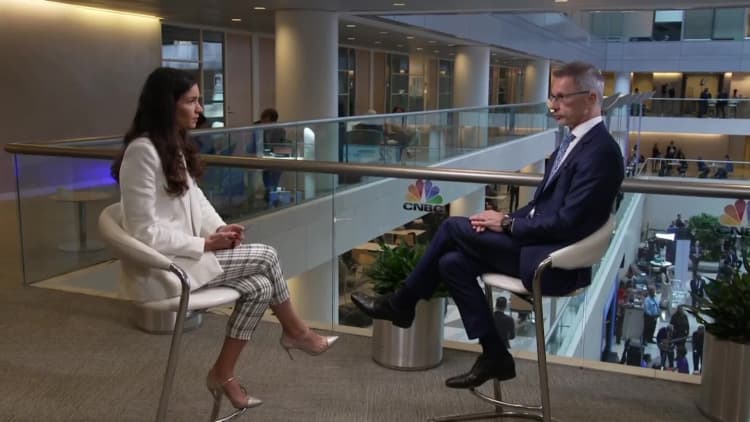The European Central Bank must “carry on and act consistently” with interest rate hikes as it continues its efforts to tackle high inflation, policymaker Olli Rehn said Friday.
Rehn, who is a member of the ECB’s Governing Council and governor of the Bank of Finland, said that the central bank’s next rate decision will be “data dependent,” particularly as it pertains to stubbornly high core inflation.
Euro zone core inflation — which excludes volatile energy, food, alcohol and tobacco prices — reached an all-time record of 5.7% in March, up from 5.6% in February. Headline inflation, meanwhile, fell significantly to an annual rate of 6.9% last month.
“Inflation is still by far too high, and especially I’m concerned about core inflation, underlying inflation,” Rehn told CNBC’s Joumanna Bercetche at the International Monetary Fund’s spring meeting in Washington, D.C.
The ECB has raised interest rates by 50 basis points at its last six consecutive policy meetings. However, Rehn said the moves have yet to have a significant impact.
We have been reaching restrictive territory and it’s important that we don’t relax prematurely.
Olli Rehn
Governor of the Bank of Finland
“In my view, it is important that we carry on, and act consistently, but we have to calibrate our decision on the basis of an approach based on data dependency,” he added.
“We have been reaching restrictive territory and it’s important that we don’t relax prematurely.”
Asked whether Europe was poised for a period in which interest rates were held higher for longer, Rehn replied, “I would concur with that.”
He added, “Once we reach the peak policy rate, perhaps over the summer … then we have to keep the peak policy rate at a stable level for a sufficient period of time to see that core inflation is genuinely in a sustained decline.”

Rehn’s comments come as a number of ECB policymakers indicated this week that they may be reconsidering the path of interest rate hikes in the wake of last month’s banking turmoil.
The ECB hiked rates by 50 basis points in mid-March at the height of the banking stress, despite some calls for the central bank to pause.
Yet, several ECB Governing Council members this week noted the risk of a knock-on economic impact of continued hikes.
“Quite definitely what we experienced with the bank crisis in the U.S. and with Switzerland, this led to changes in outlook and if the outlook changes, we have to change our views,” said Austrian National Bank Governor Robert Holzmann.
Earlier Friday, Boris Vujčić, governor of the Croatian National Bank, reiterated that the bank’s upcoming decision would be “data dependent.” However, he suggested that a 25 basis point hike could be in the cards at forthcoming meetings.
“It will be, as we say, data-dependent as to what we decide to do in May, whether we stick with the 50 basis points or we move down to the 25 basis points,” Vujčić said.
— CNBC’s Elliot Smith contributed to this report.


